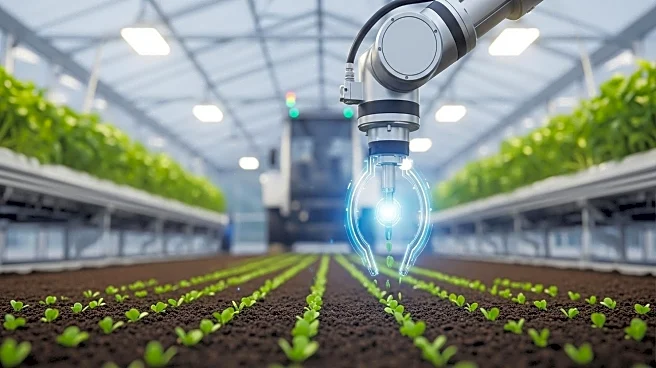What's Happening?
Syngenta Vegetable Seeds has partnered with Heritable Agriculture to leverage artificial intelligence (AI) in determining the best vegetable varieties for growers. The collaboration aims to use AI tools to accelerate seed placement decisions by analyzing historical data on geographical conditions, crop trials, and other key variables. This initiative seeks to predict optimal seed performance by region and climate, providing growers with the best-performing varieties in diverse conditions. Heritable Agriculture, founded at Google X, will use AI to model the interaction between genetics, soil variables, and weather conditions to enhance vegetable seed performance.
Why It's Important?
The application of AI in agriculture represents a significant advancement in optimizing crop production and improving yield outcomes. By utilizing AI to analyze complex data sets, Syngenta and Heritable Agriculture can offer growers more precise and effective seed placement strategies. This approach not only enhances productivity but also supports sustainable farming practices by reducing resource use and environmental impact. The partnership underscores the growing importance of technology in agriculture and its potential to transform traditional farming methods.
What's Next?
As AI technology continues to evolve, its integration into agricultural practices is expected to expand. Future developments may include more sophisticated predictive models and decision-support systems that further optimize seed placement and crop management. The collaboration between Syngenta and Heritable Agriculture could serve as a model for other agribusinesses seeking to incorporate AI into their operations. Additionally, ongoing research and innovation in AI-driven agriculture will likely lead to new applications and solutions that address the challenges of climate change and food security.
Beyond the Headlines
The use of AI in agriculture raises important ethical and practical considerations, such as data privacy and the potential for technology to disrupt traditional farming communities. As AI becomes more prevalent, stakeholders must navigate these challenges to ensure equitable access and benefits for all growers. The partnership also highlights the need for collaboration between technology providers and agricultural experts to develop solutions that are both effective and sustainable.











